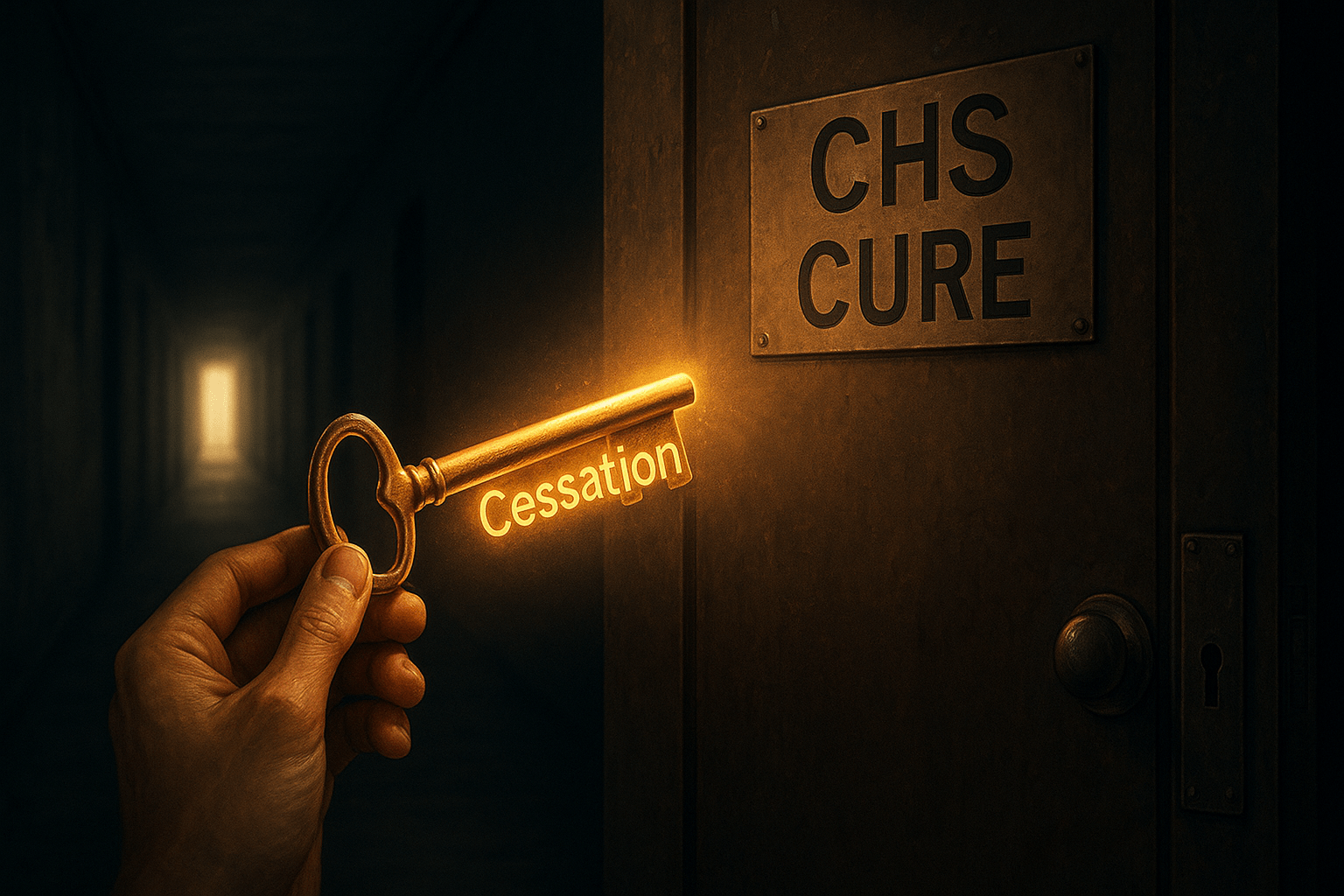- Home
- Preventing CHS
- Searching for Hope

Searching for Hope: Can Cannabinoid Hyperemesis Syndrome (CHS) Be Cured? What Research Says
If you've experienced the misery of Cannabinoid Hyperemesis Syndrome (CHS), the question "Can CHS be cured?" isn't just academic – it's deeply personal and urgent. You want the debilitating nausea, the uncontrollable vomiting, and the constant abdominal pain to stop, permanently.
So, let's get straight to it: What does current science and clinical experience tell us about a cure for CHS?
The Straight Answer: Yes, Symptoms Can Be Cured (with a Catch!)
Here’s the most crucial piece of information: Yes, the active symptoms of CHS can be completely resolved and "cured" in the sense that they stop happening. The catch? This cure relies entirely on one specific action: complete and total cessation of cannabis use.
- Removing the Trigger: CHS is understood to be caused by chronic overexposure to cannabinoids (mainly THC) leading to a dysregulation of your body's internal systems (like the endocannabinoid system and TRPV1 receptors). When you stop consuming cannabis in all its forms (smoking, vaping, edibles, tinctures – everything), you remove the trigger that's causing the system overload.
- Allowing Recovery: Once the trigger is gone, your body can begin the CHS recovery process. Over time (days, weeks, sometimes months), the nausea subsides, vomiting stops, appetite returns, and the need for coping mechanisms like hot showers fades. You return to your normal state of health.
So, in the practical sense of making the illness go away, cannabis cessation is the definitive CHS cure.
Why Isn't There a "Magic Pill" Cure While Still Using Cannabis?
This is where hope often meets a hard reality. Many people wish for a CHS treatment that would allow them to continue using cannabis without symptoms. Based on our current understanding, this isn't feasible:
- System Overload Problem: The core issue in CHS seems to be that the body's systems are overwhelmed and reacting paradoxically to cannabinoids. Taking a pill likely wouldn't fix this fundamental dysregulation while the offending substance is still being introduced.
- Developed Sensitivity: Once CHS develops, the body appears to maintain a heightened sensitivity. Even small amounts of cannabis after a period of recovery can trigger a rapid and severe CHS relapse. It’s like an allergy or intolerance that, once established, doesn't just disappear.
What is Current CHS Research Focusing On?
While research isn't focused on finding a way to use cannabis safely after developing CHS, scientists are actively working to understand the condition better and improve management:
- Understanding Mechanisms: Latest CHS research delves deeper into why the body flips its response. Studies are exploring the precise roles of the endocannabinoid system (ECS), TRPV1 receptors, gut-brain signaling, and potential genetic factors that might predispose someone to CHS. A better understanding could eventually lead to more targeted ways to manage acute symptoms.
- Improving Diagnosis: Faster, more accurate CHS diagnosis prevents unnecessary tests and suffering. Research into biomarkers or refined diagnostic criteria is ongoing.
- Better Symptom Management: Scientists are investigating why standard anti-nausea medications often fail in CHS and whether other drugs (like low-dose antipsychotics or specific receptor modulators) could be safer and more effective for providing temporary relief during severe episodes. This is about managing the crisis, not curing the underlying susceptibility while use continues.
The Key Takeaway: Symptom Resolution vs. Underlying Susceptibility
It's helpful to think about it like this:
- The Symptoms Are Curable: You can absolutely stop the cycle of sickness by stopping cannabis use. This is the CHS cure in terms of resolving the illness itself.
- The Susceptibility May Be Permanent: The tendency for your body to react negatively to cannabis once CHS has developed seems to be long-lasting, if not permanent. This means that for most people, resuming cannabis use isn't an option if they want to remain symptom-free.
Finding Hope in Recovery
Hearing that the only cure involves quitting cannabis can be difficult, but it's also empowering. You hold the key to stopping the symptoms. The CHS recovery process allows your body to heal and lets you reclaim your life from the debilitating cycle of sickness. While ongoing CHS research aims to improve understanding and acute care, the path to being truly "cured" of CHS symptoms currently lies in embracing a cannabis-free lifestyle.
What are your thoughts on the CHS cure? Has cessation worked for you? Share your journey or questions in the comments below.
Disclaimer: This information is for educational purposes and is not medical advice. Always consult with a healthcare professional for diagnosis, treatment, and management of Cannabinoid Hyperemesis Syndrome.
